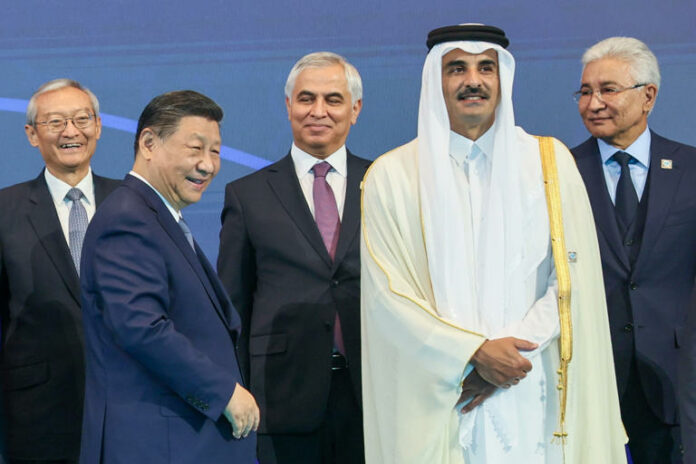Story by Pierre Haski
photo of Chinese President Xi Jinping, Qatar’s Emir Sheikh Tamim bin Hamad Al-Thani and SCO Secretary Zhang Ming at the 2024 SCO summit of heads of state.© Sergei Savostyanov/TASS via ZUMA
-Analysis-
PARIS — It’s not about looking for a grand conspiracy or a simple explanation; but we can’t help being struck by the accumulation of crises in the world: the wars in Ukraine or Gaza, the rise of the far right and the polarization of our debates, the hardening of Russia, the tensions with China in Asia. In short, is it just a coincidence, or is there a certain coherence?
Last year, Vladimir Putin and Xi Jinping exchanged a few informal words in front of the cameras during one of their many meetings. The Chinese president told his Russian counterpart: “We are experiencing changes in the world that have not been seen for 100 years, and we are leading these changes together.”
This cryptic sentence caused quite a stir, as it seemed to give the Sino-Russian couple an excessive leadership role. But it certainly showed an ambition: to emerge from these changes with an international order that would give greater prominence to Russia and China.
This is what is at stake in the current upheavals.
The flaw in the system
We live in an international order that was shaped at the end of World War II, and which largely bears the stamp of the dominant West. The world has undergone many changes since then: decolonization, the end of Soviet communism, economic globalization, the emergence of powers from the South. Yet the world order remains unchanging; and that is exactly what is fracturing today.
This is obvious if we look at international relations, with Russia and China, each in their own way, attempting to change the balance of power; it’s also the case if we look at the emerging powers: China, Brazil, India and Saudi Arabia. They are all demanding a greater place at the decision-making table, and some even want to preside over it with hegemonic ambitions.
These crises are both national and global, and their solutions will be as well.
It’s increasingly complicated in terms of national crises, like the one we’re currently experiencing in France and elsewhere, with the rise of the extreme right. But here again, we can see a painful end to the cycle.
Electoral electroshock
Some of the flaws in our society, as in other Western countries, are the result of decades of poorly managed globalization. Relocations that have produced industrial deserts, social and regional inequalities that are reflected in the electoral map, a feeling of abandonment and decline despite a positive global reality. This is what gave rise to Brexit and Donald Trump in 2016, and it is what we’re experiencing today in France.
The conclusion of this brief tour of the world is that we are in the midst of an epochal change: the end of the “Western-centric” world of 1945, the end of the glorious globalization of recent decades, the end of the illusion of unequal democracies. These crises are both national and global, and their solutions will be as well.
There’s nothing inevitable about it: last year, Poland and Brazil broke out of their populist deadlock, and now the UK is even taking a different direction. We must first agree on the diagnosis and the remedies.





